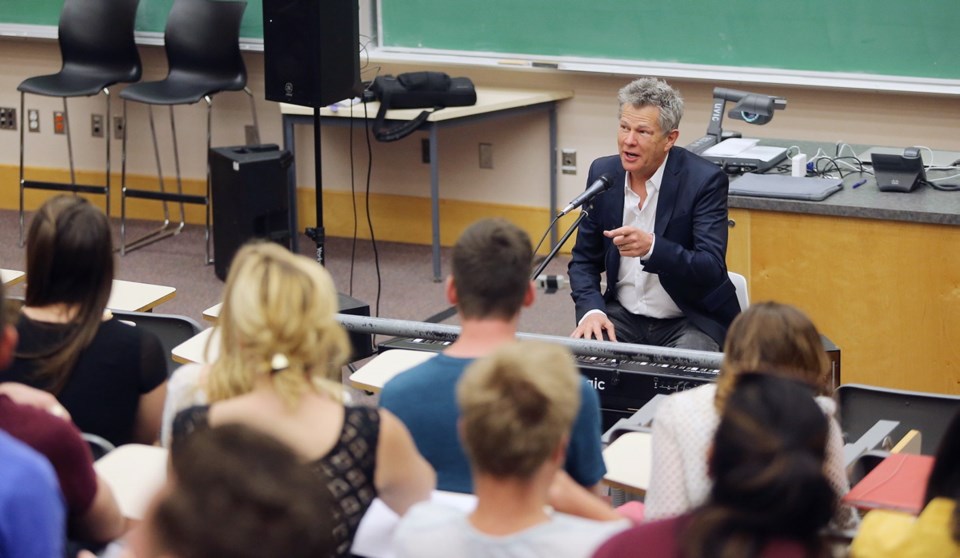“What is the most important key to success?”
Famed music producer David Foster threw that question out to students packing a University of Victoria lecture hall Thursday.
They tossed back: doing what you love, attitude, relentlessly pursing the next best opportunity, vision, determination, passion.
Foster’s answer:
“Networking.”
Two minds are better than one, he told the group, urging them to work together. One student jumped on board, announcing he is staging a networking party for everyone who attended the lecture.
Victoria native Foster is a 16-time Grammy winner who has composed hit after hit and spent decades working with music’s biggest names. His philanthropy includes the David Foster Foundation, which helps families with children needing organ transplants.
Foster is being honoured as UVic’s 2015 Distinguished Entrepreneur. Part of that gig is speaking to students. Foster waived the usual lecture, instead opting for a question-and-answer session with a group composed mainly of students in the Peter B. Gustavson School of Business. He was engaging, blunt, motivating, and, of course, entertaining. He later attended a gala event at the Victoria Conference Centre.
Sitting at a keyboard at the front of the lecture hall, Foster punctuated his words with music. He even accompanied a Shaw cameraman in an impromptu performance of the song of My Girl.
Foster told students: “Good is the enemy of great.”
He has known people who could have been great but stalled at good. “I have no pity for them because if they aren’t working on Saturday or Sunday, somebody else is.”
Foster said he never did drugs, calling them a diversion and distraction.
Waking with a daily goal of being great doesn’t mean that will always happen, he said.
Asked about how he knows which project to take on, Foster said, “I don’t know. I’ve made a lot of mistakes. I made a lot of right choices. I’ve written a thousand of songs — 100 of them have been hits and 900 have been failures.”
However, he pointed to hearing Michael Bublé and Céline Dion and knowing he wanted to work with them.
“Work on something that millions of people are going to want.”
Blessed with perfect pitch, that was just one element of his career success. When as a boy, he heard the radio playing a Beatles song, “that literally changed my life” and he found his life’s direction.
“If you can find the thing that you love, that’s what you should pursue.”
Raised in modest circumstances, Foster learned to live within his means. His mother was an early mentor as she stretched dollars to feed a family of nine. His father was another mentor, teaching him to play the piano in a style he is using these days in a special project. Foster is working with top recording artists who are performing songs from Disney movies.
Long hours, nights with two hours’ sleep, poverty, little money and a family to support are all part of Foster’s personal history. Throughout, he looked for the next chance, describing how, as a session musician, he studied producers, watching what they did.
“I don’t believe in luck. Luck is when hard work meets opportunity.”
If you’re prepared, something good is going to come along, he said.
A real-time example cropped up in the lecture hall. He told one young woman, who manages her sister’s music career and asked for advice: “She should have been here.”
If the musician had been present, she would have been brought to the piano to play for him. It turns out the musician is in Toronto. But her sister knew five days ago that Foster would be speaking here.
“I would have got her on the plane from Toronto,” he said. A low-cost red-eye flight would have allowed the two to meet.
“Next time, bring your sister or get her another manager. Fair enough? he asked. “Fair enough,” the manager replied.
The audience also got some matter-of-fact financial advice to set aside enough to pay taxes and to live within their means.
When it is time to pay taxes, Foster said he tells his own children, “Write that cheque gratefully and happily. You live in the greatest country in the world.”



